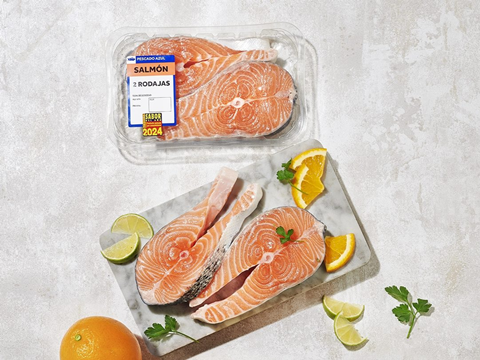
Lidl is packaging its entire fish range in trays made with 80% recycled PET – which, alongside pre-existing rPET trays for fresh meat, are set to avoid 2,116 tons of virgin plastic every year.
The move aligns with Lidl’s worldwide REset Plastic strategy, through which it plans to combat single-use plastic waste by cutting 30% of plastic from its own-brand items, utilizing at least 25% recycled materials in the same range, and completely transitioning into easily recyclable plastic from 2025.
The strategy centres around five pillars – REduce, REdesign, REcycle, REcollect, and REideate.
In the last seven years, the retailer claims to have reduced the use of plastic in its sales by 30% and plans to increase this figure in the future.
By utilizing packaging containing recycled plastic, Lidl hopes to help reduce waste and prevent recyclable materials from ending up in the natural environment.
“At Lidl we are committed to optimizing our packaging, constantly seeking sustainable alternatives that preserve the quality and safety of our products,” says Michaela Reischl, CSR director at Lidl.
On a wider scale, Schwarz Group, which operates Lidl, has also set a target to use 30% less plastic in its private label packaging across its divisions by 2030. Apparently, it has already surpassed its original goal of using 20% less plastic across countries by 2025.
Michael Janzer, director of Corporate Social Responsibility Purchasing International at Lidl, explained to Packaging Europe that Lidl backs the EU’s target of achieving 100% economically viable reusability or recyclability in packaging by 2030. He highlighted that the retailer does not prefer one material over another in its efforts to achieve more sustainable packaging, instead claiming to prioritize a material’s recyclability and the packaging’s design.
For example, Lidl Switzerland has joined forces with Hardegger Käse to wrap its organic cheeses in cellulose-based packaging made from leftover wood. The film is said to be free of crude oil-based raw materials and aims to preserve taste and guarantee product safety.
Other retailers are also working to reduce the amount of plastic in their fish packaging. Tesco previously worked with Keep Sea Blue to implement recycled plastics into its fresh fish packaging – aspiring to keep 500 tonnes of discarded plastic out of the ocean; while Sainsbury’s now offers its own-brand fish and chicken lines in kerbside recyclable cardboard trays and aims to save 694 tonnes of plastic annually.
If you liked this story, you might also enjoy:
The ultimate guide to the Packaging and Packaging Waste Regulation in 2024
How are the top brands progressing on packaging sustainability?
Sustainable Innovation Report 2024: Current trends and future priorities
Everything you need to know about global plastic sustainability regulation














No comments yet